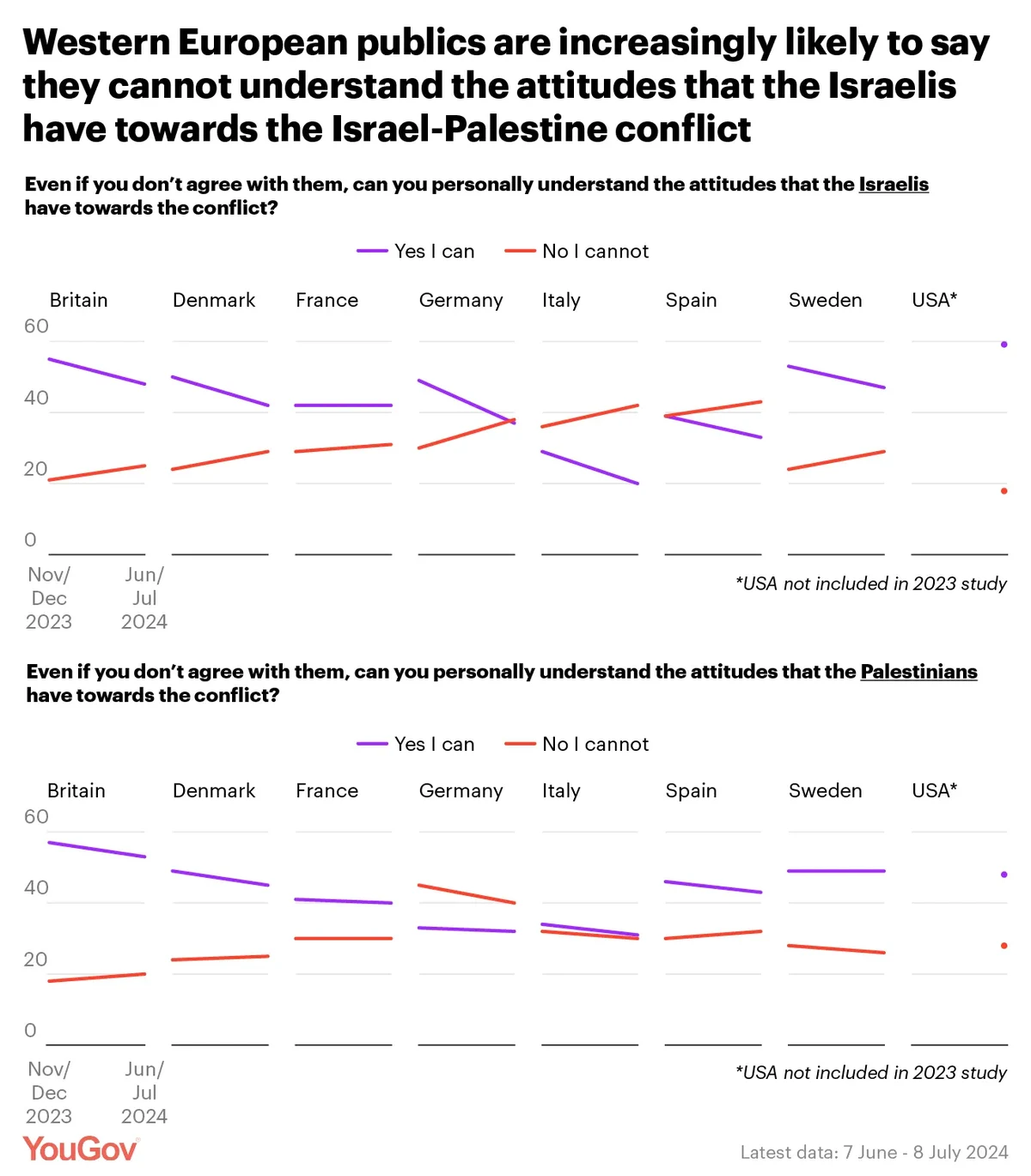Nine months after Hamas launched attacks into Israel, the conflict in Gaza continues with no end in sight. A new YouGov study of seven western European countries (Britain, Denmark, France, Germany, Italy, Spain and Sweden), as well as the USA, now revisits questions we asked earlier in the conflict and pre-conflict to see how attitudes have changed, as well as covering more recent developments.
Both sides in the conflict are generally seen as having committed war crimes
Earlier this year a statement by the UN’s top human rights official, Volker Türk, said that “clear violations of international humanitarian law, including possible war crimes, have been committed by all parties”.
The large majority of people in each country surveyed – between 70% and 75% – believe that Hamas have committed war crimes during their attacks on Israel and in the conflict to date.
Similar numbers (62-74%) of Western Europeans likewise believe that Israeli forces have committed war crimes over the course of the Gaza conflict, but Americans are noticeably more sceptical, with only 49% saying they think Israel has committed war crimes. This is, however, still significantly higher than the proportion of Americans who think that Israel has not committed war crimes, at 26%.
Only 8-14% of Western Europeans think Israel has not committed war crimes during the Gaza conflict, and likewise only 5-10% from any country surveyed believe Hamas are innocent of war crimes.
There is consistent majority support for an ICC arrest warrant for Hamas’s Gaza leader Yahya Sinwar, but more mixed responses when it comes to Israeli prime minister Benjamin Netanyahu
In May of this year, the chief prosecutor of the International Criminal Court (ICC) – Karim Khan – said that he was applying for international arrest warrants for top officials in both the Israeli government and Hamas for war crimes and crimes against humanity. Figures named included Israeli prime minister Benjamin Netanyahu and Hamas leader in Gaza Yahya Sinwar.
Opinion on these arrest warrants largely echoes those on the wider issue of war crimes in the country. Most Western Europeans and Americans (57-65%) think that an arrest warrant should be issued against the Hamas leader, and that Sinwar should be arrested if he enters their country following such a warrant being issued (58-63%).
These figures are again typically lower when it comes to Benjamin Netanyahu. In Western European countries, 44-57% say the arrest warrant should be issued, a figure which falls to 38% in the USA. This is nevertheless still the most common stance in each country – 30% of Americans say no arrest warrant should be issued for the Israeli prime minister, as do 13-24% of Western Europeans.
Most in Western Europe say Israel should stop military action and call a ceasefire
In our previous survey in November there was already majority support in Western Europe for a ceasefire, a figure which has only grown since then. Between 61% and 76% in each country say that Israel should now stop military action and call a ceasefire – Americans are notably less likely to feel this way (49%), although this sentiment is still more common than the belief that Israel should continue to take military action (29%).
More now say they sympathise most with the Palestinians than in late 2023
The extent to which sympathies have changed since late last year differs from country to country. There has typically been some reduction in the number of people saying they sympathise with the Israeli side more, coupled with an increase in those saying they sympathise most with the Palestinians.
Germans in particular have become less likely to say they sympathise most with the Israeli side, falling 10 points to 19% since November. This has not been accompanied by a similarly large increase in those saying they sympathise most with the Palestinian side, which is up only three points to 15%.
Other countries have seen increased support for the Palestinians, however. There have been nine point increases in Italy (to 28%) and Sweden (to 27%) in people saying they primarily sympathise with the Palestinians, as well as an eight point increase in Britain (to 28%), and in Spain it has risen seven points to 34%.
Support for recognition of an independent Palestine has risen
In each country surveyed, support for the national government to recognise Palestinian statehood outstrips opposition – as it did in our pre-conflict survey in May 2023. Additionally, with the exception of the US, such support has increased since last year’s survey.
The Italians are the most likely to say that their national government should recognise Palestine as an independent state, at 57%, an increase of nine points since May 2023. Next most likely are the Germans on 49% (up seven points) and Britons on 47% (also up seven points).
The greatest increase in support for the national government to recognise Palestinian statehood has been in Sweden, rising 10 points to 41% - although this is somewhat redundant as Sweden has officially recognised an independent Palestine since 2014.
In Spain, which recognised Palestine as an independent state on 28 May this year, 43% of people say the government should recognise Palestinian statehood, up five points from the previous survey a year ago.
In the US, there has been a slight increase in support on both sides of the argument – the number saying the government should recognise an independent Palestine has risen from 37% to 41%, while the number saying they should not do so rose from 20% to 25%.
Western Europeans are increasingly likely to say they cannot understand Israeli attitudes on the conflict
In most countries surveyed there has been a significant drop in the number who say they can understand the attitudes that the Israelis had to the conflict, and nowhere more so than in Germany.
In November, Germans were significantly more likely than not to say they could understand Israeli attitudes (49% vs 30%) – since then those figures have converged, with 37% still saying they can understand the Israeli mentality but 38% now saying they cannot.

Two-state solution still the only resolution to the Israel-Palestine conflict that most back in Western Europe and the US
A ‘two-state solution’ continues to be the only approach to peace in the Middle East that most people support, receiving the backing of 56-71% in each country. Only 15-28% support a ‘one state solution’, and just 7-16% back the status quo.
Expelling one group or the other from the region receives little backing – 6-17% would support expelling Palestinians from the region, while 4-12% would support expelling Jews from the region.
More see a permanent peace in the next decade as realistic, but this is still not a widely held view
The idea of peace in the Middle East might look like a fantasy as the fighting continues in Gaza, but the rising death toll may eventually bring an international impetus to resolve the situation once and for all.
A permanent peace deal being reached in the next 10 years is seen as increasingly possible by Western Europeans, although this is still a minority view: only 20-37% in each country feel this way, with Danes being the most optimistic and French people being the least.
What do you think about arrest warrants for Israeli and Hamas leaders, the Gaza conflict in general, and everything else? Have your say, join the YouGov panel, and get paid to share your thoughts. Sign up here.
Photo: Getty









